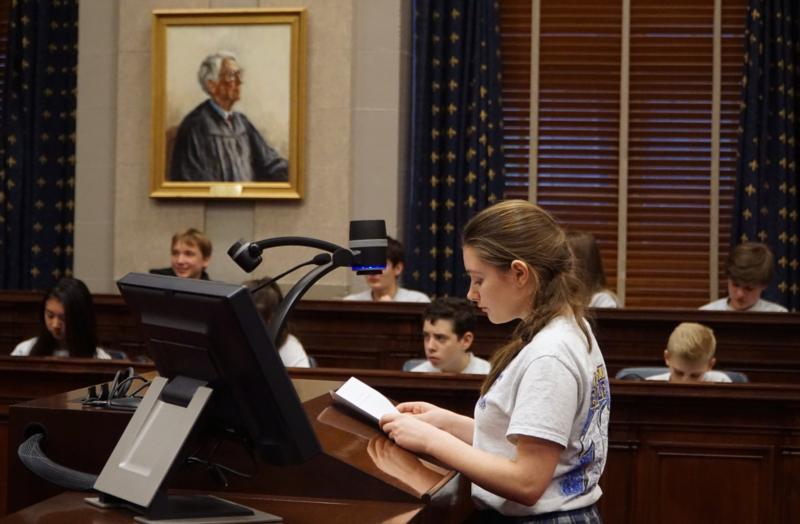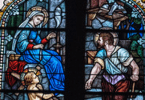
Anna Federico, an eighth-grader St. Aloysius School in Pewee Valley, Ky., plays the role of Atticus Finch in a re-enactment of Harper Lee’s “To Kill a Mockingbird” at the Gene Snyder Courthouse in Louisville, Ky., Feb. 19. (CNS photo/Simon Caldwell, The Record)
by Marnie McAllister
LOUISVILLE, Ky. (CNS) — As news broke that Harper Lee, author of “To Kill a Mockingbird,” died Feb. 19, eighth-graders from St. Aloysius School in Pewee Valley were re-enacting the book’s famous trial in a courtroom at the Gene Snyder Courthouse in downtown Louisville.
During the last of three re-enactments, presiding Judge Charles R. Simpson III announced to the students that the Pulitzer Prize-winning author had died. She was 89.
“The kids were dumbstruck. I was completely in shock,” said Tosh Scheps, the St. Aloysius language arts teacher who led the field trip. “I love Harper Lee. If there was some silver lining, it added profundity to having that field trip.”
Lee’s death, he said, also helps people remember that the book’s themes — of justice, fairness and equality — are not something of the past.
“It’s a reminder of how contemporary that book is and how relevant,” Scheps told The Record, Louisville’s archdiocesan newspaper. “What I hope they take away is that we have a system in place in America … to handle justice. But regardless of that system, justice is still dependent on the people who work in that system.”
Simpson, a member of Holy Trinity Church in St. Matthews, has hosted re-enactments of the trial scene in his courtroom for years. Students from Holy Trinity School used to make annual trips to the courthouse to enact the trial of Tom Robinson, a black man in the rural South accused of raping a young white woman.
In the book, Robinson is found guilty, despite the best efforts of his attorney, Atticus Finch, whom Simpson described as “an admirable young lawyer.”
“The evidence in the book and in the case is pretty weak against the defendant and he’s a sympathetic character,” Simpson noted. “There’s a lot of suggestion in the book that the victim was abused by her father. So that factors into it.”
Simpson said the students who replay the scene in his courtroom nearly always reverse the book’s verdict, finding Robinson not guilty.
Scheps said, “The reason he’s found guilty [in the book] is racism in Maycomb County. Pretty much every student who has read ‘To Kill a Mockingbird’ knows Tom Robinson got a ridiculously unfair trial. Having them act it out gives them more perspective about how the trial really should have gone.”
Simpson said he hoped students left his courtroom with a better understanding of the third branch of government.
Noting that some students are likely interested in careers in law or law enforcement, Simpson said, “They get to see what it’s all about. And that’s a valuable civics lesson. You never know, these experiences are part of building their life.”
For the St. Aloysius students, the book and mock trial are also part of their Catholic education, which teaches them to seek justice, Scheps said.
Asked if there’s a place for faith in a judge’s profession, Simpson said, “I think there’s a place for faith in our system. Some might disagree with that.”
“We try to achieve justice in our courts. Sometimes it’s a little hard to find what that is. But we try to achieve justice, fairness and do the right thing,” he said. “A judge can have faith — certainly Justice [Antonin] Scalia [who died Feb. 13] is an example of that — and still do his job in the courts.”






